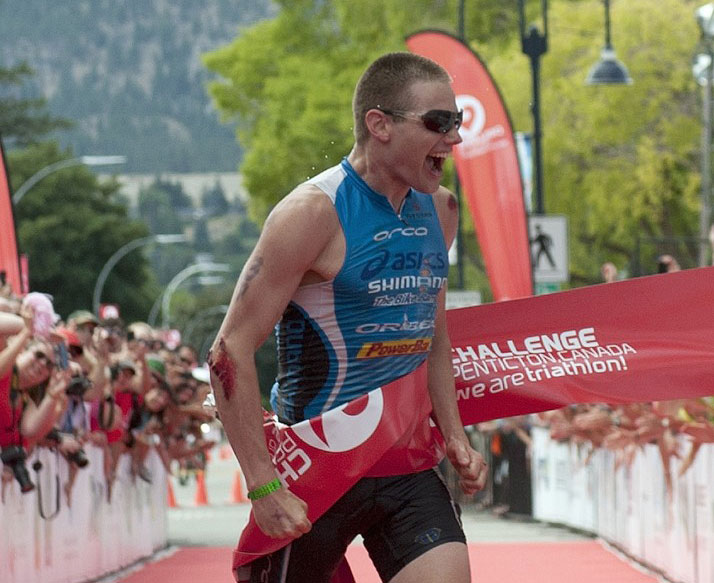Elevate your local knowledge
Sign up for the iNFOnews newsletter today!
Sign up for the iNFOnews newsletter today!
Selecting your primary region ensures you get the stories that matter to you first.

PENTICTON – The world of triathlon racing has been changing in recent years, and the management team with the Valley First Challenge Penticton wants to lead the pack in participant satisfaction.
Building the brand and providing race participants what they want are two keys to success, says Kevin Cutjar, who co-owns the race with Michael Brown.
This year’s Challenge race is the first for the new management team of Kevin Cutjar and Michael Brown.
“It’s been a busy time. A lot of energy goes to trying to get athletes in the race,” Cutjar says. He said he has been working with other Challenge races to build the brand, especially here in North America.
“There are a lot of other races on the calendar. While the Challenge brand is consistent and established in Europe, Australia and New Zealand, the Penticton race is the first in North America. Many triathletes have barely heard of the brand here,” he says.
Cutjar says it was widely assumed when the first Challenge race took place in Penticton two years ago the race would pick up where Ironman left off.
“It didn’t get off to a flying start. After the initial announcement, the excitement didn’t continue,” Cutjar says.
Introduction of the half distance event in 2014 boosted the race, and Cutjar remains excited about the future of that event. However, he thinks participation in full distance triathlon races is peaking, or has already peaked.
%%embed1%%
“The whole sport was changing even as Penticton took the Challenge race. For the first 15 years of the race here, this was the only Ironman race in North America. There are 50 world wide now, and several of those are in North America,” he says.
He used the example of the new Ironman race in Lake Tahoe, which attracts California racers who used to come to Penticton.
“People are also looking for quicker events. Many want to participate, but can’t devote enough time to training for a full distance race. We need to look at things in a different way going forward. The marketplace is changing,” Cutjar says, adding the idea of turning the race into a week long festival of events that would include racers’ families is one way of responding to that changing marketplace.
“We are still getting foreign athletes, and I continue to be passionate about the long distance race. That’s where my passion, my heart is,” Cutjar says. “But we can’t get stuck in the history of the event. We can embrace it, but we have to think outside historical boundaries.”
Cutjar says many people feel Penticton’s traditional Ironman course is what brings athletes to the region, but he’s also hearing many people are interested in a flatter course where they can finish with better times, so earlier this year, Penticton Challenge announced a new, flatter run course for this year’s race.
“We need to innovate in a changing market. If we want to see endurance athletes for a week like we used to, it won’t be because of a single long distance endurance race,” he says.
Cutjar believes strong races will survive and he considers Challenge Penticton in that category.
“We have everything it takes to put on a top class event. We can create a race with an atmosphere and a sense of occasion in this city,” he says, also noting the volunteer sector for the race continues to be strong. A recent open house held by Challenge Penticton saw more than 150 people turn out to hear about plans for this year’s event.
Cutjar says Challenge Penticton is about halfway to their registration target of 1,200 entries for the August 30 race day. He said he’d like to 500 of those athletes participating in the full distance event.
“I think we’ll hit those targets,” he says.
To contact the reporter for this story, email Steve Arstad at sarstad@infonews.ca or call 250-488-3065. To contact the editor, email mjones@infonews.ca or call 250-718-2724.
News from © iNFOnews.ca, . All rights reserved.
This material may not be published, broadcast, rewritten or redistributed.

This site is protected by reCAPTCHA and the Google Privacy Policy and Terms of Service apply.
Want to share your thoughts, add context, or connect with others in your community?
You must be logged in to post a comment.
6 responses
Exactly.I stopped doing it because I was so profoundly disappointed.I also struggled to afford to do it, even though I worked full time too.It is not available for us working class.
As founding member of this race and it’s history I am disappointed.I get it, but think it is the easy way out.The course and the volunteers are what made this race famous.I objected at the time to Ironman branding as I honestly believe(d) this race and our people can stand on their own. If you build a great race,people will come…..Is Challenge any better……don’t think so,but time will tell.
As a person who grew up in Penticton and watched the whole thing start with like 12 athletes and then grew to 3000.I am truly disappointed.Growing up I wanted so bad to do this race.I did do it in 1999 and 2000.Loved most of my experience.However, I was disappointed to see it already succumb to business.It has only gotten worse.All about the money, the pros and so little about the average athlete and the awesome volunteers.Boo!
I hope it isn’t the same week as Ironman.
another thing that hurts business in town… Last year, main street was useless for people to get to the shops, all for a few “athletes” to have their weekends… how about one for longboard skateboards? Or take a different route, leave our retail alone (downtown market already kills saturday for the south end of town).
We had THE ROLLS ROYCE…BUT now we’ve got a LADA!